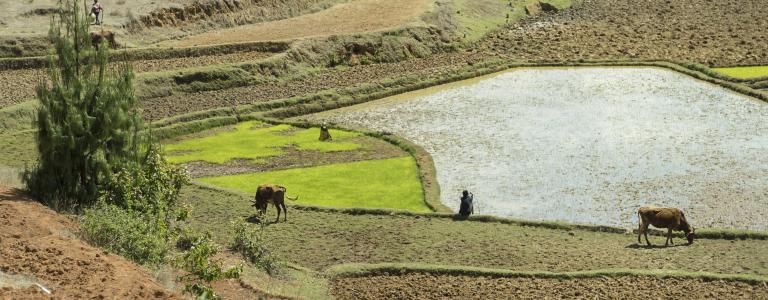Adaptation of Agricultural Value Chains to Climate Change in Madagascar
Working toward the sustainable financing, realization, and scaling of prioritized climate adaptation measures in Madagascar’s agricultural sector.
Madagascar is among the poorest countries in the world and relies heavily on the income from its agricultural sector, which provides jobs for about 80% of its population. Climate change causes extreme challenges for food production in this country, as drought, hurricanes, and heavy rainfall damage fertile lands and destroy crops.
Adaptation is crucial to ensuring increased resilience within Madagascar’s agricultural sector and sustainability in its long-term development goals, in particular, food security.
IISD experts are providing analyses around the feasibility of adaptation options for selected value chains while identifying viable pathways to financing and implementing these at scale. This will help value chains in the medium and long run to become climate resilient in three of the most vulnerable regions in southern Madagascar.
Our work involves:
- Carrying out in-depth technical-economic analyses of the prioritized adaptation measures to generate quantitative data about their technical feasibility and economic soundness.
- Defining the success of the adaptation prioritized measures, identifying how this success can be achieved, and proposing practical methods and tools to measure it during implementation.
- Identifying sound institutional frameworks for the potential future implementation of the prioritized adaptation measures.
- Mapping potential financial sources from the public and the private sectors for the implementation of the prioritized adaptation actions and developing practical pathways to access them.
- Mainstreaming key content from the climate risk analyses into practical guides for different value chains being developed at the regional level.
- Ensuring communication of results and relevant learnings at the international level.
A main objective of the Deutsche Gesellschaft für Internationale Zusammenarbe (GIZ) and PrAda program this project falls under is to support the implementation and sustainable financing of prioritized climate adaptation measures in Madagascar’s agricultural sector. The project operates on behalf of Germany’s Federal Ministry for Economic Cooperation and Development (BMZ) in Anosy, Androy, and Atsimo-Atsinanana—dry regions in the south of the country. The lead executing agency is Madagascar’s Ministry of Agriculture, Livestock and Fisheries.
You might also be interested in
AQUA-Pearl
A new project will help communities in Fiji build their resilience to climate change through nature-based approaches to oyster aquaculture.
Trade and Climate Change
IISD project on trade and climate change
Farmers for Climate Solutions Task Force
COVID-19 has been fundamentally destabilizing to much of Canadian life, and the agriculture sector is no exception.
Friends of Climate and Health
The Friends of Climate and Health is an informal group of countries working to foster international collaboration on climate change and health.






